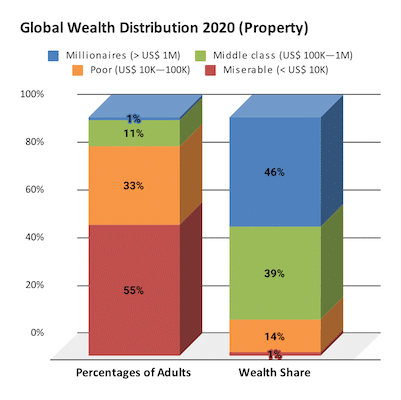By Prabhat Patnaik
The fact that income and wealth inequalities have increased quite dramatically under the neo-liberal regime is beyond dispute. The empirical work by Piketty’s team bears out the increase in income inequality. They use income tax data to infer about the share of the top 1 per cent of the population of a country in its national income. One may raise objections to this method of estimation, but the conclusions are so overwhelming that one can scarcely quarrel with them. In India’s case for instance Piketty and Chancel find that the top 1 per cent which accounted for just 6 per cent of national income in 1982 increased its share to over 22 per cent in 2013 and a similar figure in 2014, the latest year for which they have estimates. In fact the share in 2013 was the highest it has ever been since income tax was introduced in India in 1922.
Piketty’s theoretical explanation for such increases in income inequality however is totally untenable, as it is based on the presumption that a capitalist economy always operates at full employment, which is not only empirically false but also logically flawed, for in such a case the system would lack any disciplining device without which production cannot occur under it. One does not have to go far however to find a proper theoretical explanation for the increase in income inequality: the removal of all constraints on technological-cum-structural change under a neo-liberal economy increases the rate of growth of labour productivity to a level where, notwithstanding whatever increase occurs in GDP growth, the rate of growth of employment falls compared to earlier and also falls below the natural rate of growth of the work-force, so that the relative size of the labour reserves in the work-force increases; this keeps the real wage rate tied to a subsistence level even as the rise in labour productivity growth increases the share of surplus in total output, and hence the level of income inequality. Piketty’s findings about an increase in personal income inequality are rooted in this increase in class income inequality that neo-liberalism entails (see also Economic Notes in People’s Democracy December 8).
Likewise there has been a dramatic increase in wealth inequality under neo-liberalism at least in the countries of the global south. Between 2000 and 2021, according to Credit Suisse data, wealth inequality increased even in the United States; but this increase was less pronounced than the increase in countries like India and Brazil. True, wealth inequality estimates are always somewhat dicey, since they are influenced by stock market fluctuations. In a period of stock market boom not only does the estimate of total wealth gets artificially inflated even when there has been no change in the physical stock of assets; but, since the rich are much more active in the stock market, their share in wealth also goes up, showing an increase in wealth inequality which gets reversed in a period of stock market collapse. Even so however when India shows an increase in the share of the top 1 per cent in total wealth from around 32 per cent in 2000 to 40.6 per cent in 2021, and when Brazil shows an increase from around 43 per cent in 2000 to 49.3 per cent in 2021, this increase cannot be explained by any evanescent accrual of capital gains to the top 1 per cent of the population. There are clearly more fundamental factors at work.
One such fundamental factor is the rise in income inequality itself that is rooted in the rise in the share of economic surplus in output. If we leave aside the accrual of transitory capital gains, any rise in wealth occurs through savings. This may at first sight appear odd: it may be thought that the rise in wealth would occur only through investment in physical assets; but saving may occur, and hence a rise in wealth, even when there is no investment in a country during a particular period, if it lends these savings abroad, that is, increase its wealth in the form of claims on another country. When the share of the rich in national income rises, since the rich save a higher proportion of the income accruing to them than the poor, their share in the total savings of the country rises even faster. This means that the share of the rich at the margin in the increase in a country’s wealth rises compared to what it had originally been, which means that their share in a country’s total wealth increases. A rise in income inequality in other words ipso facto entails a rise in wealth inequality.
A second factor works in the same direction, and that is what Marx had called “centralisation of capital”. Because of technological-cum-structural change, business shifts over time from small capital to big capital. This happens because new processes and products become available over time which require a growing minimum size of capital for their introduction and which therefore can only be introduced by big capital and not small capital, leading over time to a shift of business from the latter to the former. This shift has exactly the same effect as the rise in the share of economic surplus in total output discussed above: with the shift of business there is also a shift in the distribution of profits from small to big capital (that is, if small capital at all remains in business and is not totally eliminated in which case its entire profits are captured by big capital); since the proportion of savings out of profits is higher for big capital than for small capital, this raises the share of savings in output and also the share of the top 1 per cent within total savings and hence at the margin in total wealth. Wealth concentration therefore is simply implicit in the process of centralisation of capital.
So far we have been talking of changes in wealth concentration at the margin through changes in the distribution of savings. It may be asked: what if investment falls short of savings at the base level of capacity utilisation so that there is a realisation problem? But if there is a realisation problem, i.e., if there is insufficient demand when output is produced at the base level of capacity utilisation, then the realised savings will be lower than the savings that would have been generated from output at the base level of capacity utilisation; but its distribution across classes, i.e., between petty producers and the big capitalists, or between small capitalists and big capitalists, will remain the same as if all of it was being realised. The tendency towards wealth concentration therefore would remain unaffected by whether or not there is a realisation problem.
A third factor works towards making wealth distribution more unequal, in addition to the two we have mentioned till now. And that is what Marx had called primitive accumulation of capital, which covers not only cases where land is acquired from peasants gratis or at throwaway prices by big capital, but also cases where any land acquired at the then prevailing market price increases in value when industrial units are set up on them or townships are built upon them. This case of an increase in the price of land may at first sight be thought of as being identical with capital gains made on the stock market; but there is a basic difference: while stock market booms may collapse reversing the capital gains, land prices have generally only an upward movement. The acquisition of land even in such cases therefore has to be seen as primitive accumulation, since the peasants are paid a price way below the now-prevailing market price of land (that enters into the calculation of wealth).
The numerous ways that public resources are transferred gratis into the pockets of big capitalists are these days an important source of primitive accumulation of capital. This is done in the name of providing incentives for promoting growth, which is supposed to benefit everyone. But quite apart from such open ways of effecting increasing wealth inequality, big capital also engages in various forms of skulduggery for this purpose. There are instances of communal riots being engineered so as to evict people from their land that is then acquired at a throwaway price by big capital not necessarily directly but at some remove.
All these ways of deliberately effecting an increase in wealth inequality get a fillip in the period of neo-liberalism. All objections to them are brushed aside by the neo-liberal apotheosis of private expropriation as benefitting everyone, while simultaneously vilifying public enterprise. (IPA Service)
Courtesy: People’s Democracy


 Kerala CPI-M Overtures To IUML Worries UDF
Kerala CPI-M Overtures To IUML Worries UDF 